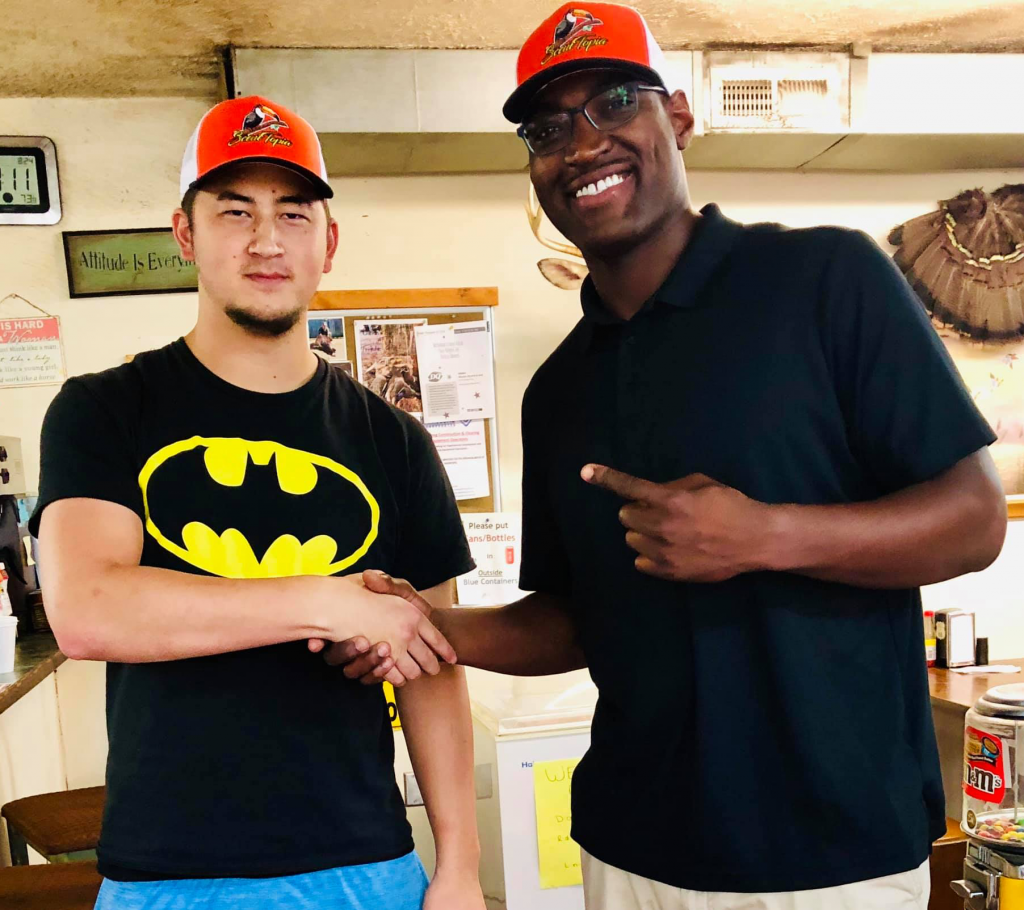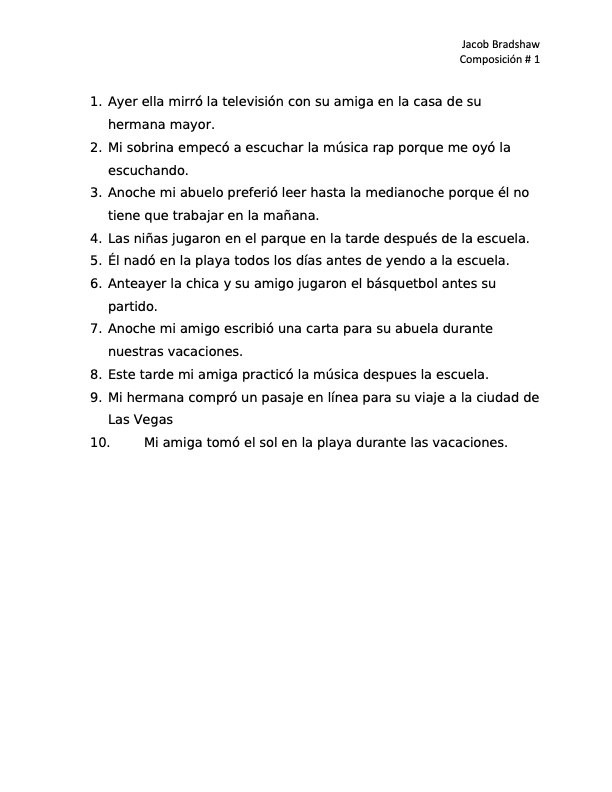Interpretive, Interpersonal, and Presentational Modes of Communication
Exploring Culture
Throughout the course, students were provided with a culture section within each chapter, covering various customs/traditions of Spanish Speaking Countries. In addition, our professor also provided us the opportunity to learn more culturally throughout various discussion board assignments.
One of the cultural activities that stood out to me was a discussion board assignment which promoted students to find Merengue songs written and composed by Juan Luis Guerra. I enjoyed this assignment because it gave me the opportunity to dive into the culture in the perspective of a Spanish speaking musician. Listening to the different ways in which Guerra spoke about his experiences in life and certain occasions within his country allowed me to understand aspects within the culture and allowed me to view things from a different perspective.
Engaging in Communities
I’ve always been in support of the maintenance of a strong community. I come from a close-knit community myself and I can testify for all of the many benefits that are included in having such a connection with one another. A few benefits include providing a platform to voice concerns locally and nationally, a supportive stronghold where members of the community are able to and generally do provide support for one another, updates and support on health and well-being of others, consistent flow of news and updates within the community and surrounding cities, as well as updates from various official and professionals. Throughout my years in my community, I can see the growth and power of being well-connected and sharing information and support for one another and I believe just as much can be said as far as global community goes.

Interpersonal Communication
Throughout the course of the class, students were given the opportunity to participate in a variety of engaging assignments. Such assignments included a Talk Abroad session where the student can speak with a native of various Hispanic speaking Countries, 1 on 1 virtual interviews. Such telecollaborative efforts were conducted with two students and held virtually in front of a Professor or either recorded and submitted online. Furthermore, throughout the semester, students also engaged in video recorded assignments, as well as discussion boards where students can share their opinion on various subjects and interact with other students.
In preparation for the Talk Abroad sessions, students were given several weeks in advance to prepare for the virtual conversation. Equipped with prior terminology and associated grammar from Spanish 101, students were able to prepare for Talk Abroad sessions with prior knowledge from previous chapter as well as new material from Spanish 102. After the teacher had assigned classmate in the class in pairs of 2, 1-on-1 interviews were also conducted via online. Throughout these interviews, students were able to apply new terminology and grammar learned from Spanish 102 chapters and develop a conversation to be recorded online or presented virtually in front of the instructor. In addition to online interviews, students were also tasked with virtually recording responses to various questions, derived from chapter material. Such videos included various grammar, conjugations with past tense, present participles, and other material covered in chapters our class had been covering. As far as the discussion board assignments, students were tasked with responding to a variety of discussions, including a variety of cultural related topics. Overall, I found the variety of all tasks conducted within the semester to be helpful in increasing my fluency within the language. I feel the most important factor in success was being able to consistently practice repetition within the vocabulary, pronunciation, as well as the grammar involved with the associated chapters within the class. I would say some difficulty could have included confusing various grammar and present/past tense conjugations throughout the chapters. However, with continued review and practice between both tenses, this allowed for the confusion to clear overtime. I feel what I could do differently next time is increase the consistency and practice within each section of chapters to allow for increased fluency and overall understanding.
Presentational Speaking
Overall, I found a lot of growth more so in the engaging virtual conversations/interviews. Having practiced doing the interviews in SPAN 101 readily helped me to achieve more success within my virtual Spanish endeavors in SPAN 102. I feel the most challenging out of all the assignments was the Talk Abroad sessions. I feel it was a good challenge, but more so any setbacks in comparison to the classmate interviews has to do with the fact that is that it is more of an open conversation and less scripted and planned. I feel where my success with Talk Abroad sessions, not only followed the repetition of grammar and vocabulary, but also having enough practice conversing with classmates throughout our prior interviews. After reviewing my first Talk Abroad session, I was able to adjust where I could apply improvements and was able to successfully do so with my 2nd session. This might have been reviewing more material from previous chapters and SPAN 102, preparing myself with more terminology in allowing for more detailed responses, and allowing myself to engage more within the conversation and ask more questions. I believe overall, that with repetition and learning from experience is what has allowed and will continue to allow for more fluency within the language.
Presentational Writing
Throughout the course, students were also tasked with completing a variety of compositions. Such writings were to be composed based off of recently learned material from the associated chapters. For example, one composition inquired for students to compose a paragraph from a standpoint of a school article, discussing the variety of activities students can engage in on and near campus and also applying newly acquired grammar and vocabulary within the composition. I found these composition assignments to be completely beneficial as it allowed us to practice the use of newly obtained information and vocabulary in a variety of context. As far as any challenges throughout this process, had to do with making sure I have applied the correct grammar in the appropriate forms, sometimes requiring me to proof my writings possibly 1 or 2 times upon submitting. Although, I do believe it is important to review any work, even in your primary language, what really has increased my ability to perform such compositions greatly had to do with preparation in advance and consistently exposing myself to repeated information and terminology from the very beginning and throughout the semester.
Below is an example of an assigned composition where students were prompted to compose 10 sentences practicing the use of preterite verb conjugations and vocabulary that we learned in the associated chapter.

Interpretive Listening
Throughout the course, students were also tasked with a variety of interactive listening activities. These activities provided as a challenge toward our ability to properly evaluate Spanish dialect and convey that we are able to interpret such material. Such activities challenged students to participate in true/false questions as well as convey our ability to decipher logical responses based on audio recordings provided in Spanish (as depicted in the example below).
In reflecting on the interactive listening that was provided during the semester, I found a lot of benefits that were reflective of such activities that contributed greatly to my learning. I find that in addition to learning the material and vocabulary, being given the opportunity to hear the content and be challenged in the form of listening, provides for an entirely unique, yet necessary learning experience. After taking 2 courses in Spanish, I have found it almost necessary to be able to be exposed not only reading, but equally in listening, as it is just as vital in the real world to be able to effectively communicate. I did find challenges in interpreting various audio listening activities. However, being provided the ability to replay certain audios and with consistent exposure proved to be beneficial overtime and I believe has overall positively impacted my ability to speak and interpret in Spanish.
Interpretive Reading
Within various interactive activities throughout our coursework, there were a number of assignments which challenged our ability in translating material through interpretive reading. Certain reading activities involved answering questions pertaining to a selected reading for an assignment, or in other cases, reading about cultural related topics within the textbook.
One of the cultural studies that stood out to me was that of the customary practice of daily naps within Hispanic culture. I had learned that through this customary practice, that it was common for men and women working throughout the day, to take a break from work, to rest for 25 to 45 minutes at their house and/or spend time eating with family/loved ones or doing other small activities before returning to work. I found this highly interesting, as this reinforces my recent decisions for such adaptations in my daily schedule. Over the past 1-2 years, I’ve consistently made it a habit to rest in the middle of the day and/or take a break in between working hours. Overall, what I found was an increased efficiency overall within the day and a refreshed mental and physical state. With that said, I found completely uplifting to a see an entire culture that embraces these practice. Also reading the scientific studies that support the benefit of daily naps, this also reinforces my encouragement of this daily practice. I imagine there would be of great benefit for people in the States who would apply these practices to their daily schedule.